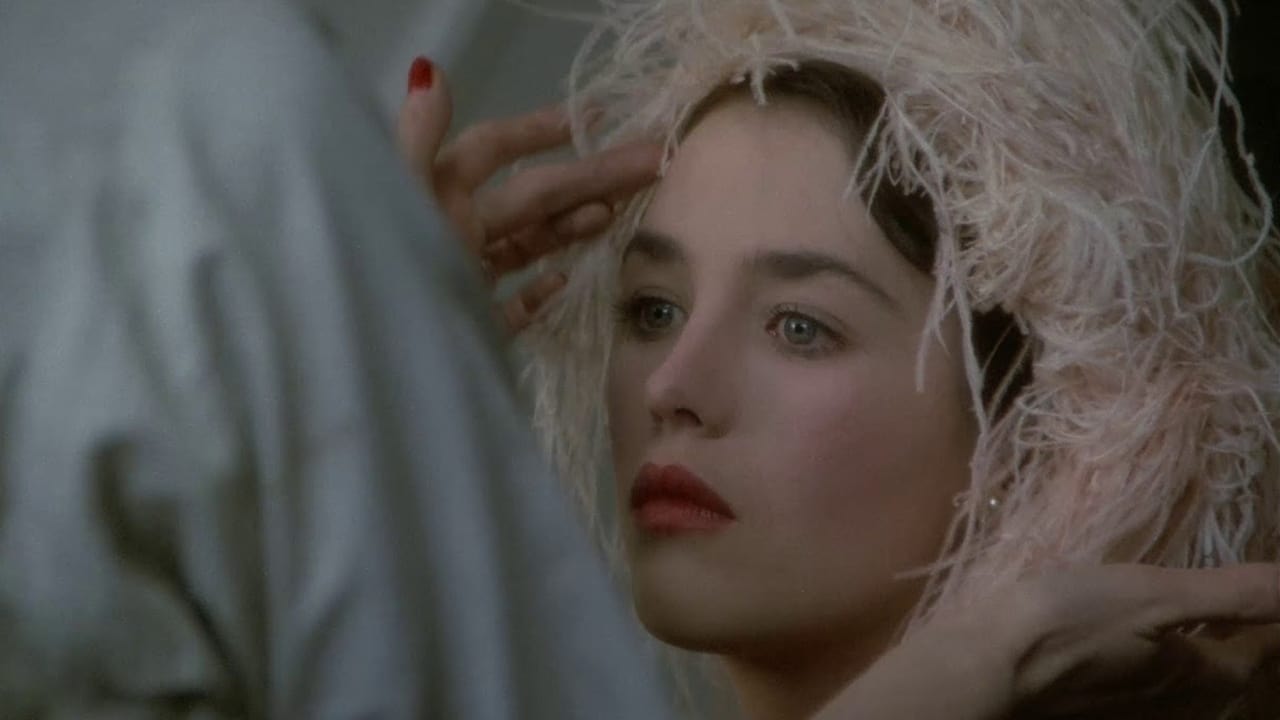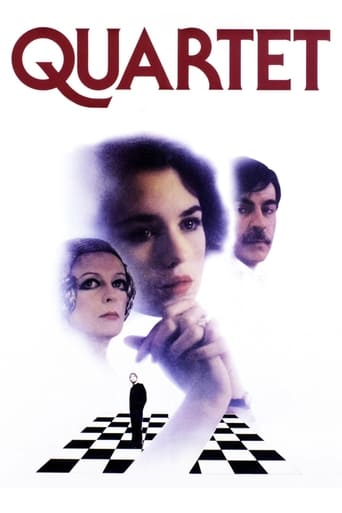

"Quartet" from 1981 takes place in Paris in 1927. Marya Zelli (Isabelle Adjani) and her husband Stephan (Anthony Higgins) in Paris and seem very much in love. One night, Marya and Stephan are in a club and Marya is summoned over to the table of the Heidlers, Lois and E.J. (Maggie Smith and Alan Bates). Lois is a painter and wants the stunning Marya to pose for her.Stephan is selling stolen art and is arrested and given a one-year sentence. Marya has no work visa. The Heidlers invite her to live in their spare room, which she does.It turns out that Heidler marriage isn't what it seems to the outside world. The reality is that Lois sort of procures pretty young women for her husband so that he'll stick around. Lois continues to visit Stephan in prison. But once released, he will have to leave Paris, and he will be broke. She's stuck -- she can't possibly be attracted to E.J., who is homely, but then again, it's either that or she lives on the street.This is a story we've seen before, as in Sister Carrie, where a woman in those days had very few options. It's actually based on a novel by Jean Rhys, which tells the story of her relationship with Ford Maddox Ford.Hard to believe this is a Merchant-Ivory film, but there it is. The film moves slowly, and at 1:45, it's too long and the people who made the picture knew it - we are treated to no less than three nightclub acts, and they're not short.The acting, of course, is fantastic, particularly from Maggie Smith, as a woman desperate to hold onto her husband at any cost. Why, we don't know, because they probably don't have much if any sex life. Alan Bates transforms himself into a homely, paunchy man and does an excellent job as a boring satyr.Until she destroyed her face with fillers and heaven knows what else, Isabelle Adjani was, by a mile, one of the most beautiful women in the world. It's hard to believe her character couldn't find some rich guy to marry and was settling for her unpleasant situation at the Heidlers. In the dresses of the period, she is exquisite. Her acting is excellent -- you can feel her frustration, depression, and acquiescence. Anthony Higgins has the smallest role but is very effective.The film turned out to be a flat experience. It's a shame because such talent could have been involved in a much more involving story.
... View MoreI was looking forward to see this movie. Finally I did and I was really disappointed. I'm positive about one thing: the script was weak and superficial. Ruth Prawer did not a good job this time. In an interview Ivory said that she was not fond of the idea of making a movie from that novel. Well, Ivory did convince her, but he was completely wrong. She botched the job, that's sure. Bates and Smith do a very good job, I'm not sure Adjani does. Anyway, I don't like to say these things about a movie director I admire so much, but truth before everything. I shall wipe my tears away watching Maurice and The remains of the day, truly the best of his movies.
... View More"Quartet" was nothing more than just "Sad Café" with Redgrave replaced by Maggie Smith. Sure, the stories are different, but Smith carried this film throughout the hour and forty minutes, I watched just her, apathetic towards anyone else. The music was dull, the scenery was again beautiful but teetered on repetitious, and our story was non-existent. Cheating socialites art thieves wives attempting to keep control the elements were all in place, but M&I could not carry the raw emotion to this film. "Quartet", simply put, was downgraded to a miserable solo.Merchant & Ivory did a great job in showing us Paris, 1920, both physically and emotionally. Having watched other films trying to capture the feel and vision of this era, they went above and beyond by handing us scenes in apartments, lounges, and those eccentric party scenes. The detail towards both the locations and the costumes were amazing, especially for Maggie Smith who seemed perfect in her imagined time and place. There was even this great scene that demonstrated the sexual consensus during this era. As this is a film about the honesty of love, it fit well into the dual-emotions being felt by both Smith and Adjani (the woman who moves into Smith and Bates' relationship). Ivory, directing this film, has done a phenomenal job of building the imagery, such as the places, events, and material feel for "Quartet", and he even does a great job in giving us the symbolism of the characters. Smith, playing the dedicated wife to her husband, HJ (played by Alan Bates), is eerily similar to the youthful Adjani - seemingly unable to say no to the forceful advances of Bates. Ivory gives us this rare glimpse to see what a youthful Smith may have been experiencing when she first met Bates, and why she allows this destructive ménage a trios. Coupled with the other sexual parodies throughout, Ivory has captured his desired emotions, but where "Quartet" fails is that he doesn't know what to do with them.So, our scenes are set up beautifully. The underlining meaning behind our characters is also in place (giving graduate students something to talk about), but exactly does this film fail. "Quartet" never reaches the level of "Sad Café" because outside of Maggie Smith, none of our characters are worth their price. A maniacal combination of over-the-top acting and horrid editing, one would nearly need to watch "Quartet" four times before fully seeing the central characters come to life. This was a difficult film to follow, because our leads were impossible to stand behind, and our story seemed rushed and never quite developed. Sure, we had great visuals to accompany them, but it wasn't enough. I never thought I knew the pressures of Adjani throughout the entire film the anger of Bates seemed to come from left field (not enough development), and Adjani's husband could have been a cardboard cut-out and still be able to get the job done. Due to the sub-par acting, Maggie Smith was able to chomp down hard and demonstrate a full range of abilities. "Quartet" is worth watching merely for Smith, but the rest will leave you bored. It fails because Ivory has created a film with the minority in mind.This is not a film for everyone, and having seen several slow-moving British films, it wasn't even right for me. Ivory seems to be lacking a universal message, something that one could escape from the film with. Something that, in a group of friends, one could say "But I did like this part because " For "Quartet" it wasn't there. Perhaps it was the translation from Jean Rhys' novel. Not everything can be translated from the printed page, and where you could read a scene as less subtle, Ivory went hysterical. There were just these moments, especially near the end, where instead of coming to a conclusion, Ivory instituted anger, rage, and screaming. It just didn't work. It didn't fit these under-developed characters. My major issue with this film is that events took place that didn't fit our actors. We were subjugated to watch them do things in this film that I do not believe they would actually do our character's actions seemed to negate their voice.Overall, "Quartet" stimulated my visual senses, demonstrated the power of Maggie Smith, and slipped some symbolic messages deep within the sub-text of the film, but on every other level it failed. Again, Smith proved that even playing a secondary character, she could take the role, give us those emotion-filled eyes, and steal away every scene possible. Even when she wasn't on screen, we couldn't help but wonder what she was doing. Ivory, as director, cannot seem to control the story. His failure comes with the horrid translation of Rhys' work. They chose to replace emotion with rage, which transformed the story's irony of love into confusing connections. Paris, 1920s, was beautiful. He hit his stride very well with our location, but the rest of the film flopped like a suffocating fish. "Quartet" is a very dry film due mainly in part to our disastrous actors unable to life and the doldrums the repeating score. It had quite a bit of potential, but never quite fulfilled any promises. Merchant & Ivory created a film that some will love, but missed their opportunity to appeal to greater masses. Not that this film had to be a blockbuster, by strengthening the characters as well as the story, Ivory could have had another solid cinematic experience. Instead, it fumbled causing the viewers to be the ones that suffered the most.Grade: ** ½ out of *****
... View MoreIt's hard to say exactly why "Quartet" fails. There are certainly some good things to be said; Maggie Smith gives her character just the right mix of not-too-subtle cynicism and self-loathing, and the photography by Pierre Lhomme does a fine job of complementing the surroundings. But there is something missing. The Merchant-Ivory-Jhabvala trio have always invested their stories with a strong compassion for their characters, lending a quiet urgency to the tone. Yet there is little of that feeling here. The desperation of Isabelle Adjani's Marya simply does not ring clear, perhaps because her emotions are kept at a distance from the viewer when they should be brought to the forefront of the story. Marya views Heidler (Alan Bates) as a dominating force, but her fears and his intimidation never develop into anything effective. Bates is an actor who can always be depended on to provide a good performance, but his character is not given enough weight to dominate the screen when he should. In films such as `Howards End' and `The Remains of the Day,' the emotional conflicts between the characters drive the story and keep the (attentive) viewer involved; here, the conflicts do not spurn enough interest because the motivations of those involved are not very clear. The overall effect of "Quartet" is very cold and somber, with few, if any, memorable results.
... View More